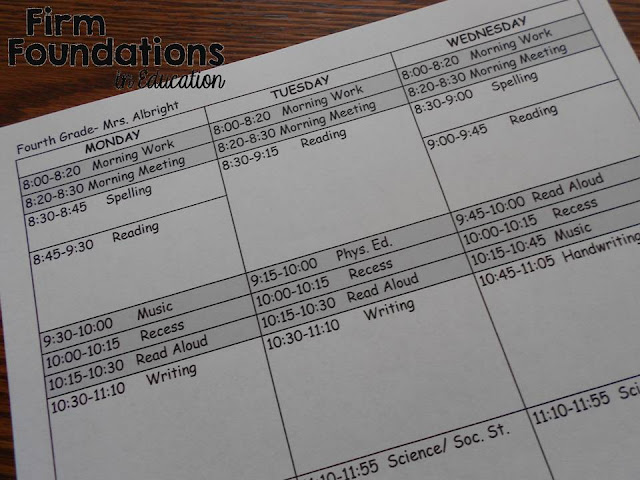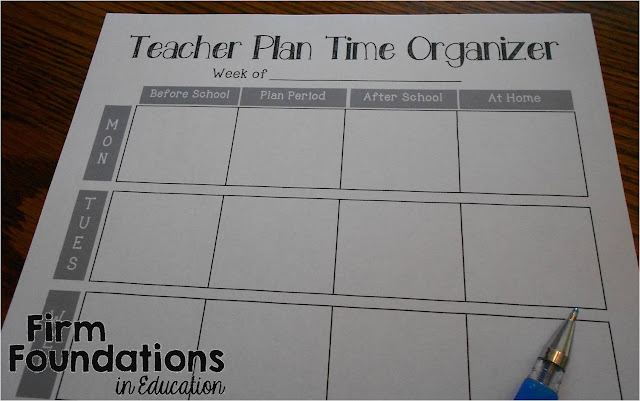As a brand new teacher, I felt prepared to plan a daily classroom schedule and make lesson plans. What no one ever taught me, however, was how to use my plan time effectively. So I found that during my first several years as a new teacher, I wasted a lot of plan time during the school day. Consequently, I ended up staying late after school many afternoons to catch up on everything that needed to be done for the next day.
Many teachers spend hours setting up or tweaking their classroom schedules over the summer to ensure they make efficient use of every minute of learning time with their students. If you have not set up your classroom schedule or lesson plan book yet, some teachers find using Planbook.com to be very helpful. I personally like to create my own plan book pages. Click here or on the image below to access an Excel lesson plan template of what I have used in my fourth grade classroom. It could be edited for various grades and contexts.
Yet, do you see how small the boxes are for my plan times when the kids are at special classes? My lesson plan
template failed to tell me what I should be doing while the kids were out of my
room so I made efficient use of my plan time.
So… in the past, my plan time has generally involved WASTING
A LOT OF TIME. How? By trying to figure out what I should be doing…by checking
e-mail…by chatting with other teachers in the teacher's lounge…
And then, by the time 3:30 or 4:00 rolled around and I
should have been heading out of the school building, I was panicking about not
feeling prepared for the next day because I didn’t have materials ready or
copies made.
So here are 10 Time Saving Tips to Plan Your Plan Time:
So here are 10 Time Saving Tips to Plan Your Plan Time:
1. List out all the times you have available for planning each week.
These generally fall into the following categories:
- Before School
- Plan Period
- After School
- Time at Home
I have included a general form for you to organize your plan time here.
Set specific times to check and respond to e-mails. Otherwise, e-mail has the ability to dictate the entire direction of your day. I always got one 15-minute break each day while other team members took my class to recess (Lucky me, I know!) I used that 15 minutes, the end of my lunch period, and the first 10-15 minutes after the kids left my room for the day to respond to e-mails or phone calls. If communications took longer than that, I tried to schedule a block of time on my Plan Time Organizer to handle lengthier communications.
I always did general lesson plans and made most of my copies the week before I actually taught my lessons for the week. However, I blocked out a chunk of time each day to gather all materials needed for the next day and to take time to review the next day's lessons. By having everything prepared for the next day, I left school knowing that I wouldn't be panicking in the copier line the next morning to frantically prepare for the day as the students were arriving.
- Before School
- Plan Period
- After School
- Time at Home
I have included a general form for you to organize your plan time here.
2. Record weekly meetings you have each week on your Plan Time Organizer.
For me, this meant I would plug in my weekly faculty meeting, 4th grade team meeting, math committee meeting, and student support meeting. Some weeks I may not have had these meetings, but I allowed room in my schedule for them anyway! Make room in your schedule for margin! (More on that later!)
3. Decide in advance how you will handle e-mails, phone calls, and parent communication.
Set specific times to check and respond to e-mails. Otherwise, e-mail has the ability to dictate the entire direction of your day. I always got one 15-minute break each day while other team members took my class to recess (Lucky me, I know!) I used that 15 minutes, the end of my lunch period, and the first 10-15 minutes after the kids left my room for the day to respond to e-mails or phone calls. If communications took longer than that, I tried to schedule a block of time on my Plan Time Organizer to handle lengthier communications.
4. Record when you will prepare materials and lessons for the next day.
I always did general lesson plans and made most of my copies the week before I actually taught my lessons for the week. However, I blocked out a chunk of time each day to gather all materials needed for the next day and to take time to review the next day's lessons. By having everything prepared for the next day, I left school knowing that I wouldn't be panicking in the copier line the next morning to frantically prepare for the day as the students were arriving.
5. Record when you will plan lessons for each subject or class for the following week.
Allot time to plan each subject. Try to stick to the time you have allotted for each subject. If you have a special unit or project to plan out, record when you will set aside time to complete that planning.
6. Allow extra time in your schedule for margin.
Plan for things to take longer than they should! That way if your spelling planning doesn't take the entire 30 minutes you allotted for it to take, you can get ahead on another task you need to complete. Leave some "empty" chunks of time in your schedule to catch up on work or to complete tasks that came up on the spur of the moment.
7. Decide on when you will leave school each day.
Set a time to leave the school building, and make every effort to stick to that time. For example, it was generally my goal to leave school at 3:30 every day except for Wednesday. I stayed at school until 4:45 that day to finish up my lesson planning for the next week and to catch up on other work. Afterwards, I met my husband for dinner, and I had a good feeling that I wouldn't need to stay at school late on Friday afternoon to finish up things for the following week.
8. Schedule time for making weekly copies and other tasks that need to be completed each week.
By having the majority of your copies made a week in advance, you limit the stress that can be created by having the copy machine breaking down when you need it most.
Also schedule time for creating your weekly newsletter or class blog post if you do that on a weekly basis.
9. Record major assignments that will need to be graded each week.
By keeping a record of what you will need to grade each day, you will become aware if you need to limit the amount of work you collect for a grade. For example, if students turned in book projects that I knew would take me a lengthy amount of time to grade, that week I tried to have students spend more time looking over their own work, or I tried to spot-check assignments so I was not so bombarded with grading at home.
10. Keep a list of things to do in upcoming weeks.
As things pop into your mind that need to be done, record them on your Plan Time Organizer along with your projected timeline to complete them. However, devote your time to completing tasks that are essential for the current week and next week.
Keep in mind that your "Teacher Plan Time Organizer" is a work in progress. As the school year unfolds, you will find that you forgot to include something on your organizer or that you need to allot more time in a specific area than you first thought. That's okay! Your plan is a flexible and changing document, and you many need to update it many times throughout the year.
I'd love to hear your thoughts about how you "plan your plan time." Please feel free to comment about what you have found to be helpful as you try to maximize your time as a teacher!










No comments: